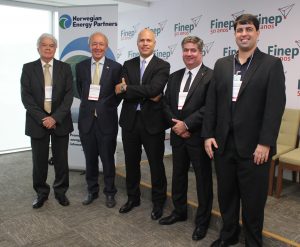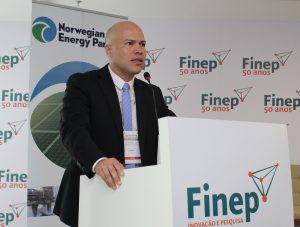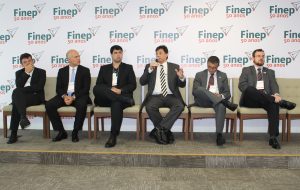 Key industry players from Norway and Brazil discuss the decommissioning scenario in Brazil at NORWEP seminar in Rio de Janeiro on November 6, 2017.
Key industry players from Norway and Brazil discuss the decommissioning scenario in Brazil at NORWEP seminar in Rio de Janeiro on November 6, 2017.
Norwegian Energy Partners (NORWEP) represents the capabilities of the Norwegian Energy Cluster within Upstream Oil and Gas, and at the seminar on November 6, Norwegian capabilities and solutions were addressed and experiences shared with the Brazilian market. According to the Brazilian national oil agency ANP, more than 40 percent of the offshore facilities in Brazil have surpassed 25 years of operation and close to 80 facilities are expected to be decommissioned in the years to come. Most of the facilities are fixed platforms, and there will be needs to identify innovative and cost effective solutions for maintenance of these fields.
The first session of the NORWEP seminar was entitled «Brazilian state of art in decommissioning and maintenance in fields in late production», and HSE and Operations Manager at the Brazilian Institute of Petroleum and Gas (IBP), Mr Carlos Henrique Mendes set the stage in his introduction, where he talked about relevant regulations, as well as efforts to integrate environmental licensing and the offering of offshore blocks, something that does not happen in the current market. Decommissioning is also on the regulatory agenda:
«Decommissioning is a priority, a challenge and an opportunity. A priority because we are in an early phase in Brazil, and need to reduce uncertainties and follow the best examples and best practices from abroad. The lack of experience makes it a challenge», Mr. Mendes said.

Mr. Marcelo Mafra, ANP
ANP is drafting a regulation which aims to reduce uncertainties related to decommissioning activities in Brazil, and this was addressed by Marcelo Mafra in his keynote. Mr. Mafra is the Operational Safety and Environment Superintendent of ANP.
«The decommissioning scenario in Brazil for the next five years is considerable, and performance and risk parameters will guide the regulatory updates. ANP aims to minimize barriers to investment and reduce the costs imposed by regulations.
Today, the operator has one year to present a decommissioning program to the ANP after the production phase is completed, and wether installations need removal or not, procedures for waste cleaning and environmental recovery, criterias for monitoring of decommissioned assets are some of the critical issues that need to be defined. According to current regulations, installations in up to 80 meter depth need to be removed completely from site. A multi criteria risk assessment is what ANP would like to see from the operators.
«Several decommissioning plans have already been approved by ANP, but this is a slow process today, and what we are looking for, is to develop best practices and guidelines for the process, and look abroad for benchmarking with international regulatory bodies.
Ibama is the Brazilian environmental regulatory body, and Ibama analyst Fernando Galheigo welcomed innovative solutions in his presentation on Ibama´s role in the decommissioning process.
«Ibama would like the process to be as cost and time effective as possible, and we are solution oriented, we do not look to impose limitations. But bad evaluations or poor planning could lead to inadequate management decisions. In the end this is about reducing the environmental impact», Mr. Galheigo said.
In the last keynote in the morning session, Petrobras´decommissioning manager Eduardo Zacaron talked about how Petrobras plans for life extension and decommissioning.
«The demand is increasing, and our main concern in these very comprehensive processes is to reduce risk. It is in the decommissioning of submarine subsea systems that we have the greatest uncertainty, but the biggest cost is in well abandonment. Scale could reduce cost, and Petrobras seeks an approach between industry and regulators to develop solutions that balance environmental protection, operational safety and technical and economic feasibility. Early in the process we need to focus on what we are decommissioning, and this will open a window for operational details, for how to do the decommissioning. Differentiated solutions are required, and decommissioning should be considered as early as possible in the life cycle of the asset order to seek synergies and cost reduction», Mr. Zacaron said.
Showcasing Norwegian solutions
In the second session of the seminar, selected companies shared Norwegian cost reduction experiences and showcased solutions relevant for late life production and decommissioning in Brazil.
The products and services presented range from management tools to new technologies for well abandonment.
Tobias Alvarenga from DNV GL opened the session talking about the importance of ensuring cost efficient solutions to grant safety, reliability and regulatory compliance. Cost management is a priority to most stakeholders, and Norway has successful experiences. DNV GL has developed several relevant management tools and is involved in offshore decommissioning projects around the world.
José Fratantonio from ABB do Brasil also addressed digital solutions.
«ABB offers digital solutions that can prolong the life of the asset at a lower cost, giving you time to plan for decommissioning and take the adequate measures. Without proper planning, cost increases. We can meet all digital needs and energy management and asset condition monitoring in real time are some solutions we offer», Mr. Fratantonio explained
Rodrigo Vieira of Siemens do Brasil presented a service of proactive life cycle management by obsolescence management.
«Through this tool you get insight into critical systems, which enables you to make the best possible strategic decisions. The obsolescence management tool collects and analyzes data, identifies criticalities and makes recommendations, for you to prolong the life of your asset and plan your projects with due diligence.»
Guilherme Rodrigues from the company Fire Security presented a unique coating system called FS-5, a water-based ablative coating system, that protects electric cables by making them fire resistant in hydrocarbon fire condition, and in this way extending their lifetime. The coating can be applied without interruption of normal rig operation, and Petrobras and Total are among the company´s references.
Bruno Matos of Trelleborg Offshore do Brasil presented the Elastopipe, a solution for flexible piping, which is rubber-based, fire resistant, flexible and easy to install, without interrupting production or causing downtime.
Melquisedec Santos of 4subsea presented a service of automated and digitalized monitoring of the subsea asset. «SWIM, or subsea wellhead integrity monitoring is a hardware tool that during the process of Plug & Abandonment of a well would provide more control, extend the weather window and optimize the operation», he explained.
Aker Solutions have provided decommissioning services to the Brazilian market since 1995.
«The main lesson learned is to begin decommissioning before asset closure. Aker Solutions would like to see Brazil becoming an exporter of late life and decommissioning goods and services», Telmo Ghiorzi of Aker Solutions do Brasil said in his presentation.
Gabriel Quintans from IKM Testing do Brasil presented advanced cutting techniques that his company offers, like diamond wire cutting, for large wall thickness and composite materials, and the abrasive water jet cutting, for both steel and concrete cutting
Roar Hansen presented the Real-time environmental monitoring offered by Kongsberg Maritime do Brasil, where a variety of sensors, sonars, cameras on the seabed gather data that can be sent directly to the production unit or elsewhere, or be stored in a cloud and retrieved later. The company has also developed permanent ocean observatories to be installed on the seabed.
Terje Hauan from Interwell talked about a rigless plug and abandonment solution under development, where you restore the caprock on wireline, by melting materials together, and all done from a vessel. It is not a commercial product yet, but big companies in Norway are working with Interwell on the development of the project.
Mr. David Labbé of Subsea7 shared the perspective of a subsea contractor and focused on key elements to success in the decommissioning of a subsea project.
«Regulatory and licensing issues must be identified and dealt with upfront. Shore side reception of waste product most be pre-organized, and early engagement with supply chain keeps cost down. These are some of the lessons learned», he said. His advice is to keep in mind that asset data may be incomplete and in some cases, removal can be more detrimental than leaving the asset in-situ. «Planning and early engagement is key to avoid surprises», Mr. Labbé said.
 Panel debate
Panel debate
After lunch, the way forward was addressed in a panel debate. Moderator was Nathan Biddle from Premier Oil, and Marcelo Mafra (ANP), Eduardo Zacaron (Petrobras), José Fratantontio (ABB), Telmo Ghiorzi (Aker Solutions) Tobias Alvarenga (DNV GL) and David Labbé (Subsea7) were part of the panel.
What can be done to reduce both cost and risk, was one of the many questions the panel addressed. Information and knowledge, proper planning and early engagement to reduce the unknown factors, as well as a close cooperation between operator and supplier or service provider, in order to seek the more adequate solutions together, is the way to go.
«The great barrier is the knowledge, or lack of knowledge of what assuming a decommissioning project would imply», David Labbé, of Subsea7 commented.
Mr. Alvarenga, of DNV GL, commented that the Brazilian industry lacks what he called a business culture of planning ahead. «This is a moment, an opportunity to reinvent itself. Planning means predictability», he said.
Mr. Mafra said that Brazil also needs regulations that don´t strangle business due to high cost. «Regulations also need to be open for innovation.»
The seminar was sponsored by the Brazilian Ministry of Science, Technology, Innovation and Communication and Finep and DNV GL and supported by IBP and ZoomOut. Petrobras was also involved in the development of the program, as well as Ibama and ANP.
The event took place in the auditorium of Finep in Rio de Janeiro, and the cooperation with Norwegian stakeholders like Norwep and Innovation Norway is of great importance to Finep, deputy head of international department, Mr. Alexandre Barragat stated
The event was part of the first Norwegian-Brazilian Business and Science Week, and was chaired by Norwep Brazil manager Adhemar Freire and regional director Gulbrand Wangen.
SOURCE: NORWEP
:

